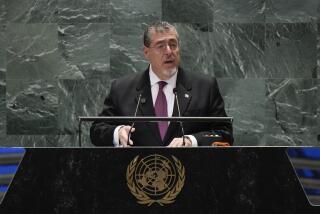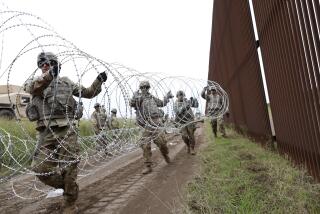No ‘Vietnam’ in Colombia, U.S. Stresses
WASHINGTON — The White House asserted Monday that the deployment of U.S. military advisers to Colombia will not become “another Vietnam situation” or lead to a “massive troop buildup” that draws the United States into a shooting war overseas.
Acknowledging critics’ concerns that American military personnel could become involved in Colombian drug raids, White House Press Secretary Marlin Fitzwater said that the 30 advisers are there only to provide training and will let the Colombians do the fighting.
But, he said, “their orders are the same orders that our forces anywhere in the world have and that is that they have the right to defend themselves.
“There is risk associated with U.S. forces there at any time,” he said, adding: “Colombia is a very dangerous place to be these days.”
The stepped-up efforts by the United States and Colombia to stem the illegal flow of cocaine from Colombia to U.S. drug markets has been met with an increase in violence there. On Monday, a former mayor of Medellin, a center of the Colombian drug trade, was assassinated by masked gunmen.
No Combat Role Foreseen
President Bush reiterated the Administration’s insistence that no combat role is foreseen for the U.S. troops.
The President, who met with British Foreign Secretary John Major and reviewed Britain’s plans to provide “training and technical assistance” to Colombia, said in a speech:
“There is no contemplation of the . . . use of American armed forces in any combat role there. No U.S. military personnel will accompany host government forces on actual field operations. Our personnel will provide training, equipment and operational support as we have been asked to do.
“I will see that it works, just exactly that way,” the President insisted.
As he has done repeatedly since he unveiled his anti-drug plan a week ago, Bush continued in his public appearances to try to drum up support for his drug war strategy. He used a ceremony marking the 200th anniversary of the Treasury Department as a platform to pledge that “we are going to track every lead that we receive from whatever source to separate the drug barons from the drug money.”
Great Involvement Possible?
The dispatch of the troops to advise Colombians raised questions about whether the deployment would become a first step toward greater U.S. military involvement in South America. Such questions were given added urgency in recent days with the disclosure that a National Security Decision Directive signed by Bush would allow the troops to train Colombians in areas beyond their base camps--a move that presumably would increase the risk that they could come under fire.
Fitzwater, speaking with reporters, said:
“We are interested in not letting misinformation get out about this use, and there’s a lot of people who are trying to portray this as another Vietnam situation or the beginning of a massive troop buildup and so forth.”
He said the Administration wants “to knock down” such an impression. The bitter U.S. military involvement in Vietnam began with the deployment of small numbers of advisers intended to counsel Saigon’s troops in their guerrilla war with the Communist-led Viet Cong.
No Expanded Military Role
Fitzwater also said that any expanded role for the U.S. military in the drug fight in Colombia, Peru and Bolivia would require an additional National Security Decision Directive--the classified paperwork ordering the Pentagon to act on the President’s decisions.
The spokesman, portraying a limited role for the advisers in Columbia, said, “My understanding is that our support is related to the operation and maintenance of the equipment.”
The flow of U.S. military gear to Colombia, announced in August by the White House, is well under way, Bush suggested.
“Today, we’ve supplied over $10-million worth of equipment, 10 aircraft, five UH-1 helicopters, an assortment of jeeps, ambulances and armor,” Bush said at the Treasury Department. “Sixteen members of the American armed forces are in Colombia to oversee the supply operation and provide training.”
Emergency Assistance
The supplies are being sent under a $65-million emergency assistance program in the current fiscal year, which ends Sept. 30. In addition, Colombia, Peru and Bolivia would receive $261 million in military and law enforcement assistance next year.
Bush also said that the United States is “working with the Colombian judiciary to increase the physical safety of judges and other members of the judicial system, and that includes security training as well as the delivery of armored cars and vests and communications equipment already under way.”
After a week of public debate over the President’s plan, White House officials were upbeat over the outcome. They expressed optimism that Democrats’ complaints that the spending is insufficient is not catching fire with the public.
More to Read
Sign up for Essential California
The most important California stories and recommendations in your inbox every morning.
You may occasionally receive promotional content from the Los Angeles Times.










